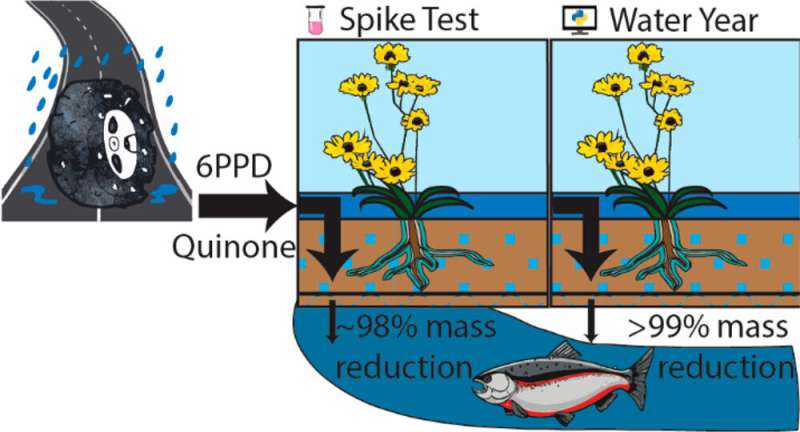Rain gardens could save salmon from toxic tire chemicals

Specially designed gardens could reduce the amount of a toxic chemical associated with tires entering our waterways by more than 90 percent, new research shows.
The chemical 6PPD-quinone can form when car tires interact with the atmosphere. It enters rivers and streams when rain runs off roads into waterways. It is toxic to coho salmon, rainbow trout and some other fish.
“Rain gardens,” or bioretention cells, are gardens engineered to reduce flooding and soak up contaminants when road runoff is directed onto them.
Rain gardens in Rain City
With the City of Vancouver, UBC researchers Drs. Timothy Rodgers (he/him) and Rachel Scholes (she/her) tested a Vancouver rain garden at 8th and Pine, pumping 14,000 liters of water spiked with 6PPD-quinone onto the garden for four hours and testing the water draining from beneath the garden at frequent intervals. They found only about two to five percent of the chemical made it through, with about 75 percent captured by the soil and plants.
Extrapolating their results using a computer model, the team predicted the garden would prevent more than 90 percent of the chemical from directly entering salmon-bearing streams in an average year.
Save our salmon
Vancouver’s Rain City Strategy will build more “green infrastructure” including rain gardens, and municipalities could use the research to plan where and how to place these, the researchers say. This could include targeting areas with large highways that runoff into salmon-bearing streams and such systems could help meet multiple municipal environmental goals simultaneously.
“Anywhere where you know there’s salmon, you should be trying to direct that runoff as much as possible into systems like this,” says Dr. Rodgers.
The study is published in the journal Environmental Science & Technology Letters.
More information:
Timothy F. M. Rodgers et al, Bioretention Cells Provide a 10-Fold Reduction in 6PPD-Quinone Mass Loadings to Receiving Waters: Evidence from a Field Experiment and Modeling, Environmental Science & Technology Letters (2023). DOI: 10.1021/acs.estlett.3c00203
Citation:
Rain gardens could save salmon from toxic tire chemicals (2023, June 21)
retrieved 21 June 2023
from https://phys.org/news/2023-06-gardens-salmon-toxic-chemicals.html
This document is subject to copyright. Apart from any fair dealing for the purpose of private study or research, no
part may be reproduced without the written permission. The content is provided for information purposes only.
For all the latest Science News Click Here
For the latest news and updates, follow us on Google News.

